Chile enhances the quality of environmental monitoring
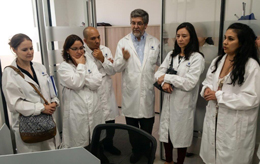
© ERC-Chile
In Chile, confidence in environmental information has been undermined by inadequate quality assurance of environmental measurements. Together with SYKE, the Finnish Meteorological Institute and VTT Technical Research Centre of Finland, the Chilean authorities planned a reference laboratory centre for environmental measurements in 2017.
The Centre promotes the accuracy of measurements in laboratories, disseminates good practices and organises qualification tests for professionals in the field. High-quality environmental monitoring plays a key role in the development of the forest and mining sectors, which are important growth areas for Chile. SYKE's strong expertise in environmental measurements in the chemical industry was essential to cooperation.
In co-operation:
Chilean authorities, Eurochile, Finnish Meteorological Institute, VTT Technical Research Centre of Finland
Read more:
SYKE ’s geographical information service is used to secure
the archaeological national relics of Egypt
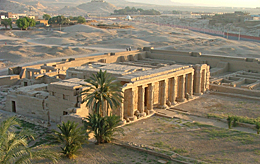
© Olivier Loux
The geographical information system implemented by SYKE is also used to protect valuable archaeological sites during the construction of the new metro line in Cairo. The information system serves the Egyptian authorities and also the extensive international research community in the field of Egyptology and archaeology. With the help of expertise provided by SYKE, the capacity of the Egyptian Antiquities Authority’s GIS centre was improved, and the information system can be extended to cover all sites with cultural and historical value in Egypt.
In co-operation:
Egyptian Antiquities Authority
Read more:
International cooperation improves state of the Gulf of Finland
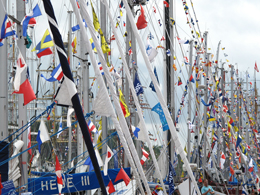
© Esa Nikunen
Persevering cooperation involving Finland, Estonia, and Russia has improved the state of the Gulf of Finland and the quality of its evaluation, while supporting conservation methods. SYKE's scientific understanding of eutrophication and its knowledge and skills in fighting it have played a significant role in the cooperation. SYKE pinpointed and evaluated the gypsum mountain of the EuroChem Fosforit plant on the Luga River as the largest single source of phosphorous emissions into the Baltic Sea. As a consequence, EuroChem upgraded the treatment of its waste water which improved the state of the eastern Gulf of Finland. Thanks to SYKE studies, the water utility of the city of St. Petersburg introduced chemical phosphorus removal which reduced the nutrient load on the Baltic Sea.
In co-operation:
EuroChem, City of St. Petersburg; several institutions in Russia, Estonia and Finland.
Read more:
Nature conservation administration improved in Central Balkan countries
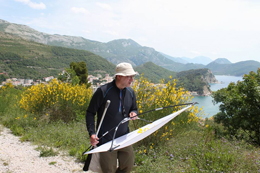
© Krista Kujala
Central Balkan countries have lacked comprehensive information on local species and have had no established nature conservation practices. SYKE has supported the development of nature conservation administration in the Central Balkans, improved the authorities’ information resources and legislative capacity, and identified future nature conservation tasks.
Supported by SYKE’s solid expertise on species, experts in Montenegro have mapped the country’s habitats and species. This work has safeguarded nature, promoted natural science and provided development opportunities for local nature professionals. Similar work will begin in Macedonia.
In co-operation:
Nature conservation administration in Montenegro
Read more:
New water and climate services for Andean countries
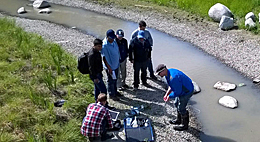
© Johanna Korhonen
Due to their location in the Andean region, Bolivia, Ecuador, Columbia and Peru are highly vulnerable to climate change. SYKE’s experts have helped our partners in these countries to enhance their hydrological monitoring, data systems and flood protection measures.
Collaboration between the countries has intensified, and they are now better prepared to face risks related to climate change. Improved water and weather services can also help local residents to safeguard their property and livelihoods. SYKE’s open data policy, our long-term collaboration on cross-border waters, and our flood warning service, realised together with the Finnish Meteorological Institute, all provide inspiring examples of cooperation for the countries involved.
In co-operation:
Finnish Ministry for Foreign Affairs (funding), The Finnish Meteorological Institute, El Niño research institute CIIFEN (Centro Internacional para la Investigación del Fenomeno de El Niño) in Ecuador, hydro-meteorological institutes of Bolivia, Ecuador, Colombia and Peru.
Read more:
The Montreal Protocol on Substances that Deplete the Ozone Layer is an environmental protection success story
The 1987 Montreal Protocol on Substances that Deplete the Ozone Layer has already saved the world from ozone depletion once, and could even help in achieving the goals of the Paris Climate Agreement. Together with consultancy agencies, SYKE has advised emerging countries on how to implement the terms and conditions of the Montreal Protocol and other international environmental agreements. SYKE has provided expert assistance on the financing mechanism of the agreement and practical projects, for instance in Nepal and Turkey.
In Finland, SYKE has long been responsible for regulatory tasks related to the EU's Ozone and F-Gas Regulation, including the monitoring of, and advice and information on, the use of substances.
Read more:
Barents Region protected area network secures Arctic nature
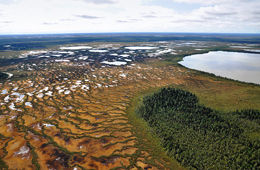
© Olle Hojer
The Barents Region’s unique forest and mire nature is particularly valuable on a global scale. Increasing use of natural resources and climate change pose a serious threat to northern nature in the area.
Authorities in the Barents region and environmental organisations have used SYKE’s GIS expertise to map ecologically valuable forest and coastal areas. The results are used in the monitoring of international nature conservation commitments, the development of the protected area network, and in adapting to climate change. Some of the mapped areas have already been included in protected area plans.
In co-operation:
Authorities and and environmental organisations in the Barents region
Read more:
The cooperation with Kyrgyzstan improves thecondition of their waterways
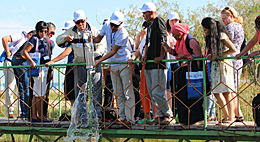
© Anssi Karppinen
Supported by SYKE’s water expertise, Kyrgyzstan is currently developing an assessment of the condition and sustainable use of the Son-Kul lake. The lake is significant for mountainous and hiking tourism in the country, but is currently polluted by environmental toxins. Evaluated at the same time are the lake’s restoration potential and a possible environmental impact of the restoration work. Supported by SYKE, Kyrgyzstan is also creating a new, open-source digital environmental information system, where companies and organizations of citizens will have a key role in sustaining and utilizing the system.
In co-operation:
Environmental and Forest authorities of Kyrgyzstan, Finnish Ministry for Foreign Affairs (funding).
Read more:
Automatic oil detection system for the Baltic Sea
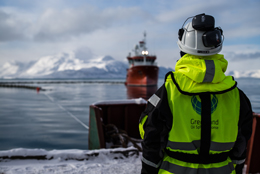
© Lars Demant-Poort
SYKE and Meritaito Oy are developing an oil spill detection and warning system for the Baltic Sea based on modern smart buoys. With the help of the system oil spills can be detected more easily than before, reducing their impact on marine nature. SYKE and its partners are also studying the environmental impacts of methods of fighting oil spills in cold conditions. Benefiting from the work are the countries of the Arctic region and international organisations that are planning and implementing cross-border cooperation to fight oil spills.
In co-operation:
Meritaito Oy; in wider co-operation several research institutions from Europe and North America.
Read more:
Nepal strengthened its environmental administration
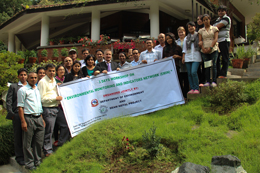
© SEAM
Industrial development in Nepal began largely without environmental regulation. Together with SYKE experts, the authorities built a model to improve the environmental performance of the country's industrial sector. Environmental permit procedures, environmental impact assessments and environmental monitoring practices in the pilot area were developed using the model.
At the same time, the preconditions were created for environmental protection throughout the country, while three hundred local projects promoted environmental health in the provinces, cities and villages. They involved improving indoor air quality and waste management, training organic farmers and building up the water supply infrastructure. At the same time, environmental awareness of actors in various sectors was promoted.
In co-operation:
Administration of Nepal, FCG International Ltd, Ministry for Foreign Affairs of Finland (Financier)
Read more: